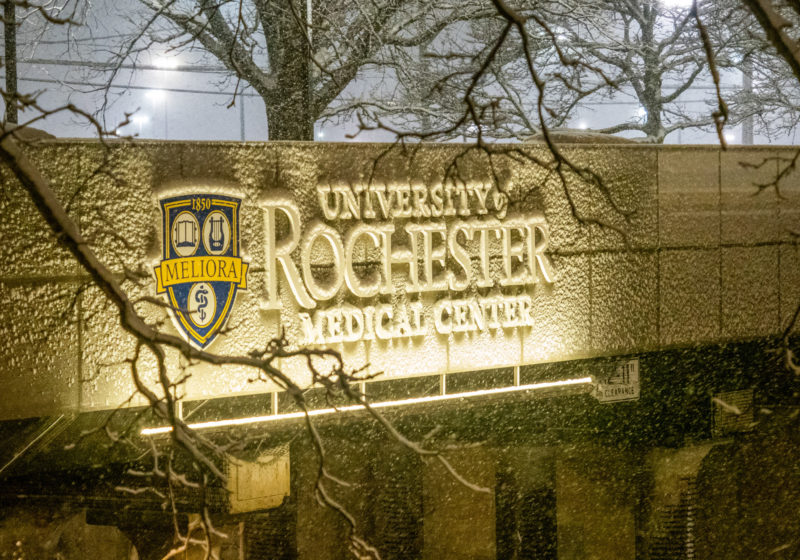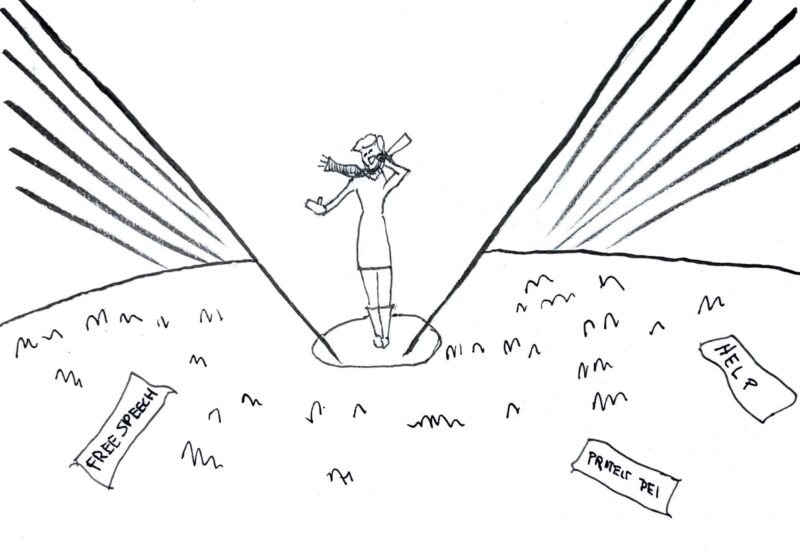It’s difficult to browse the University’s website for long before coming across a mention of regulation or legislation that mandates how the University runs.
Because the University is such a large institution, it is directly affected by many aspects of government policy — but it also wields a lot of influence on those policies.
There are two offices at the University who most directly interact with these government policies: The Office of Government and Community Relations (OGCR) works to shape policy, and the Office of Counsel works to ensure legal compliance with policy or to represent the University in the judicial system.
These offices are important to the University. Donna Gooden Payne, the University’s General Counsel, and Peter Robinson, the head of OGCR, are two of the 10 members of President Sarah Mangelsdorf’s Senior Leadership Team, and both have the title of Vice President.
As a 501(c)(3) educational nonprofit organization, the University is somewhat limited in its advocacy abilities. It is not allowed to donate to campaigns directly or to publicly tell people to support specific candidates. Nonprofits can conduct lobbying activities, but they can’t be a “substantial part of its overall activities.” All of these limitations come with the benefits of being a nonprofit, though. Namely, the University is tax-exempt and does not have to publicly report its donors.
But the University is allowed to influence policy through lobbying. OGCR publishes its state and federal legislative priorities, and requires that all lobbying for the University be done through OGCR. In their reports, they advocate for specific legislation, but not for or against any candidates.
The Office of Counsel does less to directly influence politics, but it legally represents the University or hires outside counsel to do so. That means that sometimes it argues in favor of different interpretations of laws and regulations. More commonly, though, the Counsel’s Office tries to prevent any issue from being raised by interpreting government policies and advising the University on the best course of action that is in compliance.
—
OGCR publishes a report on its community benefit, highlighting the ways it benefits society. It points to the University’s major capital investments, its innovation through research and fostering of entrepreneurship, its economic role in purchasing millions of dollars of goods from local vendors, and its ability to draw visitors to the city who spend money at local restaurants and hotels.
City Councillors Malik Evans and Mitch Gruber both said in interviews with the Campus Times that the most basic source of the University’s influence is its economic impact, especially its role as the region’s top employer. This means that the University has a profound impact on the region’s economy, as its staff members spend money and are taxed in the region. The report quantifies the tax revenue it generates at $140 million.
But some don’t think that’s enough. OGCR’s published priorities only focus on state and federal priorities. Gruber, along with his former doctoral advisor and Professor of History Stewart Weaver, argued that the University too often sees itself as a national or even global institution, and doesn’t engage enough in the community. To them, the University has not kept up with its responsibility to the city, and as a result, they think a payment in lieu of taxes is necessary.
—
Healthcare policy is a major focus of OGCR. A substantial portion of the University’s revenues and expenses flow through UR Medicine, making it particularly important to the University. Government policy around research funding, healthcare regulation, and more recently, telehealth, have direct impacts on the financial success of the University. It is not surprising that all but one of the staff members at OGCR have URMC email addresses.
The University’s recent priorities around health care include securing funding through Medicare and Medicaid, increasing grants for substance abuse prevention and mental health, lifting regulations around mental health care, supporting telemedicine, and lowering prescription drug costs.
It’s also important to note that UR Medicine is not just a focus of the University’s political agenda, but a key source of its power. It is one of the top hospital systems in the country, and the largest and highest-acclaimed hospital in the region. If the state government wants to affect public health policy, it needs to work with URMC to implement it.
In 2004, the University lost an intellectual property dispute, preventing it from gaining profits from a discovery that contributed to the development of new drugs.
But healthcare isn’t entirely positive for the University’s political image. Health Insurance Portability and Accountability Act (HIPAA) violations caused the University to pay a $3 million fine in 2019. And Daniel Prude’s quick discharge from Strong Memorial Hospital earlier on the day he died has drawn public scrutiny.
—
Though UR Medicine is a major focus of OGCR and the Office of Counsel, many issues apply to the whole University.
Immigration issues are vital for securing a full student body and a high-quality faculty. When U.S. Immigration and Customs Enforcement (ICE) issued a guidance last July that international students taking fully remote classes could not remain in the United States, the University joined a lawsuit filed by Harvard and MIT and issued a public statement calling the decision “cruel to the international students at our University and at other universities across the nation.” The ICE guidance was quickly revoked.
Another University-wide political issue is employment law, including regulations around hiring practices, worker benefits, and workplace conduct. While the University works to shape some of these policies, it moved ahead of the state to impose a $15 minimum wage.
The University also gets large amounts of federal funding. For example, the CARES Act this past year sent over $6 million to the University, at least half of which was mandated to go toward student financial aid grants.
Upon the announcement of a new multi-million-dollar contract in 2019 between the University’s Laboratory for Laser Energetics and the National Nuclear Security Agency (NNSA) at the U.S. Department of Energy, Mangelsdorf said that she was “very grateful to U.S. Senate Minority Leader Charles Schumer, U.S. Senator Kirsten Gillibrand, and Representatives Morelle, Tom Reed, and John Katko for their dedication to this funding effort and tireless leadership and support to the University.” The contract was announced only two months after the NNSA Administrator toured the Laser Lab.
This year, COVID-19-related guidelines have been another major aspect of the University’s advocacy. County-level precautions meant various capacity caps at events and dining halls. Meanwhile, health-related education policies set by the state threatened to put the University on “pause” if cases surged high enough. State policies also governed vaccine eligibility, while federal decisions such as the recent pause of the Johnson & Johnson vaccine by the Food & Drug Administration and Centers for Disease Control caused hurdles for immunization efforts.
Payne pointed out that despite the University’s best efforts, policies are sometimes imposed that go against their goals. Specifically, shifting Title IX regulations in recent years under the Trump administration both clashed with the University’s preferences and were difficult to adapt to. “We look to be compliant with rules and regulations,” Robinson added, “even if we don’t fully agree with them.”
—
Some of the policies governing the University impose hard-and-fast requirements. For example, the University is never allowed to lie on disclosure reports or violate educational privacy laws.
But many of the rules and regulations governing the University are conditional. The University is unable to support or oppose specific candidates for office not because it can’t, but because doing so would threaten its nonprofit status, and it considers its nonprofit status more important than supporting or opposing political candidates.
Similarly, Title IV education funding is used by the government to influence what universities do. Though marijuana was recently legalized by the New York State government, the Drug-Free Schools and Communities Act prevents cannabis use on college campuses that receive federal funding. This use of conditional aid to influence what the University does even manifests itself in the annual Constitution Day program put on by SA.
“By far, where we spend the majority of our time is on compliance,” Payne said.
This seems to highlight the importance of politics at the University. Complying with rules and regulations and influencing them to better fit the institution’s goals requires that the University act strategically and prioritize which things matter most. It makes sense that Payne and Robinson report directly to the President, because government policy so directly impacts the University’s decision making.




